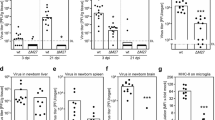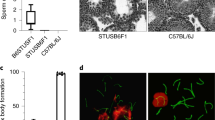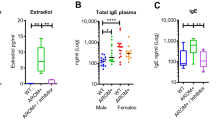Abstract
IMMUNOLOGICAL, reactions between mother and conceptus play an important part during pregnancy. It has, for example, been shown that placental size1–3, foetal size4 and length of gestation4 can be influenced by the immunological relationship between mother and foetus. As early as implantation the mouse embryo is capable of expressing transplantation antigens and the mother can react to them5,6. Mouse eggs which are genetically most dissimilar from the mother are more readily implanted7. This is also true of the rat (personal communication from W. K. Silvers and D. Wilson). It has been suggested that immunological selection of eggs at implantation might be a contributory determinant of sex ratio8.
This is a preview of subscription content, access via your institution
Access options
Subscribe to this journal
Receive 51 print issues and online access
$199.00 per year
only $3.90 per issue
Buy this article
- Purchase on Springer Link
- Instant access to full article PDF
Prices may be subject to local taxes which are calculated during checkout
Similar content being viewed by others
References
Billington, W. D., Nature, 202, 317 (1964).
James, D. A., Nature, 205, 613 (1965).
McLaren, A., J. Reprod. Fert., 9, 79 (1965).
James, D. A., J. Reprod. Fert., 14, 265 (1967).
Simmons, R. L., and Russell, P. S., Nature, 208, 698 (1965).
Kirby, D. R. S., Billington, W. D., and James, D. A., Transplantation, 4, 713 (1966).
Clarke, B. C., and Kirby, D. R. S., Nature, 211, 999 (1966).
Kirby, D. R. S., McWhirter, K. G., Teitelbaum, M. S., and Darlington, C. D., Lancet, ii, 139 (1967).
Goodlin, R. C., Herzenberg, L., and De'ath, S., Amer. J. Obstet. Gynec., 90, 776 (1964).
Levey, R. H., and Medawar, P. B., Proc. US Nat. Acad. Sci., 56, 1130 (1966).
Kirby, D. R. S., J. Embryol. Exp. Morphol., 10, 496 (1962).
Kirby, D. R. S., J. Anat., 97, 119 (1963).
Finn, C. A., J. Endocrinol., 32, 223 (1965).
Guttmann, R. D., Carpenter, C. B., Lindquist, R. R., and Merrill, J. P., Lancet, i, 248 (1967).
Tyler, A., J. Reprod. Fert., 2, 473 (1961).
Beier, H., Zool. Anz., suppl. (in the press).
Vocaer, R., Arch. Biol., 63, 1 (1952).
Potts, D. M., thesis, Univ. Cambridge (1965).
McLaren, A., J. Reprod. Fert. (in the press).
Tarkowski, A. K., J. Embryol. Exp. Morphol., 10, 476 (1962).
Author information
Authors and Affiliations
Rights and permissions
About this article
Cite this article
KIRBY, D. Inhibition of Egg Implantation and Induction of Abortion in Mice by Heterologous Immune Serum. Nature 216, 1220–1221 (1967). https://doi.org/10.1038/2161220a0
Received:
Revised:
Published:
Issue Date:
DOI: https://doi.org/10.1038/2161220a0
This article is cited by
Comments
By submitting a comment you agree to abide by our Terms and Community Guidelines. If you find something abusive or that does not comply with our terms or guidelines please flag it as inappropriate.



